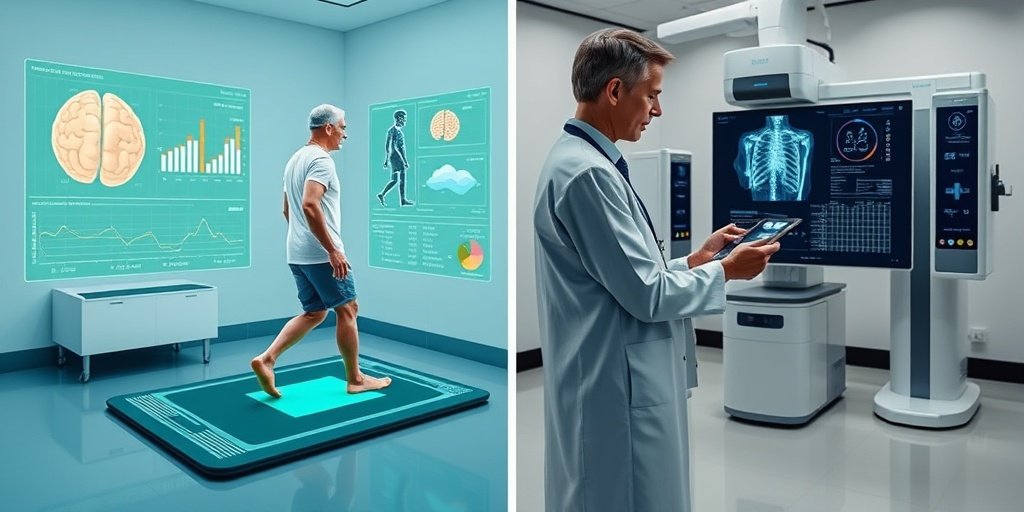⚡ Quick Summary
This study explored the use of machine learning to estimate the severity of mild cognitive impairment (MCI) through multimodal physical and behavioral measures. The findings revealed that models trained on these measures achieved a high classification accuracy of up to 94%, comparable to traditional MRI-based diagnostics.
🔍 Key Details
- 📊 Dataset: 80 patients diagnosed with MCI
- 🧩 Features used: Gait characteristics, body mass composition, sleep parameters
- ⚙️ Technology: Machine learning models including support vector machines, random forest, multilayer perceptron, and convolutional neural network
- 🏆 Performance: AUC up to 94% for physical and behavioral data models
🔑 Key Takeaways
- 🧠 Early detection of MCI is crucial for improving clinical outcomes.
- 💡 Machine learning can effectively utilize physical and behavioral data as digital biomarkers.
- 🏃♂️ Gait velocity, lean body mass, and sleep efficiency were identified as top predictors of cognitive function.
- 📈 Combining multimodal data with MRI features provided marginal improvements in prediction performance.
- 🌍 This approach offers a scalable and low-cost method for monitoring cognitive decline.
- 🔬 Study conducted using comprehensive clinical assessments and advanced machine learning techniques.

📚 Background
Mild cognitive impairment (MCI) serves as a critical transitional stage between normal cognitive aging and more severe forms of dementia. Early detection of MCI can significantly enhance clinical outcomes, yet traditional diagnostic tools like brain MRI and neuropsychological testing often face challenges in accessibility and scalability. This study aims to bridge that gap by leveraging machine learning to analyze easily obtainable physical and behavioral measures.
🗒️ Study
The research involved 80 patients diagnosed with MCI, who were classified into early- and late-stage groups based on their Mini-Mental State Examination scores. Participants underwent a series of clinical assessments, including gait analysis, body composition evaluation, and sleep assessments, alongside brain MRI for structural imaging data. The study aimed to evaluate the effectiveness of machine learning models in estimating MCI severity using these multimodal datasets.
📈 Results
The machine learning models demonstrated impressive performance, achieving a classification accuracy with an AUC of up to 94% when trained on physical and behavioral data alone. This performance was comparable to that of MRI-based models. Notably, the combination of physical, behavioral, and MRI features yielded only marginal improvements, indicating that the physical and behavioral measures alone are highly predictive of cognitive function.
🌍 Impact and Implications
The implications of this study are profound. By utilizing multimodal digital biomarkers, healthcare providers can implement a more accessible and cost-effective approach to the early detection and monitoring of cognitive decline. This could lead to timely interventions and improved patient outcomes, ultimately transforming the landscape of dementia care and cognitive health monitoring.
🔮 Conclusion
This study highlights the remarkable potential of machine learning in estimating the severity of MCI through physical and behavioral measures. As we continue to explore these innovative approaches, we may pave the way for more effective, scalable solutions in cognitive health monitoring. The future of early detection in cognitive impairment looks promising, and further research in this area is highly encouraged!
💬 Your comments
What are your thoughts on the use of machine learning for cognitive health monitoring? We would love to hear your insights! 💬 Leave your comments below or connect with us on social media:
Machine learning-based estimation of the mild cognitive impairment stage using multimodal physical and behavioral measures.
Abstract
Mild cognitive impairment (MCI) is a prodromal stage of dementia, and its early detection is critical for improving clinical outcomes. However, current diagnostic tools such as brain magnetic resonance imaging (MRI) and neuropsychological testing have limited accessibility and scalability. Using machine-learning models, we aimed to evaluate whether multimodal physical and behavioral measures, specifically gait characteristics, body mass composition, and sleep parameters, could serve as digital biomarkers for estimating MCI severity. We recruited 80 patients diagnosed with MCI and classified them into early- and late-stage groups based on their Mini-Mental State Examination scores. Participants underwent clinical assessments, including the Consortium to Establish a Registry for Alzheimer’s Disease Assessment Packet Korean Version, gait analysis using GAITRite, body composition evaluation via dual-energy X-ray absorptiometry, and polysomnography-based sleep assessment. Brain MRI was also performed to obtain structural imaging data. We evaluated the classification performance across various models, including support vector machines, random forest, multilayer perceptron, and convolutional neural network, using unimodal and multimodal datasets. Machine learning models trained on physical and behavioral data alone achieved a high classification accuracy (AUC up to 94%), comparable to that of MRI-based models, in differentiating early- and late-stage MCI. Combining physical and behavioral and MRI features yielded marginal improvements in the prediction performance. Gait velocity, lean body mass, and sleep efficiency were among the top predictors of cognitive function. Multimodal digital biomarkers or multimodal physical and behavioral signals can effectively estimate MCI severity and may offer a scalable, low-cost approach for early detection and monitoring of cognitive decline in real-world settings.
Author: [‘Park I’, ‘Lee SK’, ‘Choi HC’, ‘Ahn ME’, ‘Ryu OH’, ‘Park YS’, ‘Kim DK’, ‘Lee U’, ‘Kim YJ’]
Journal: Sci Rep
Citation: Park I, et al. Machine learning-based estimation of the mild cognitive impairment stage using multimodal physical and behavioral measures. Machine learning-based estimation of the mild cognitive impairment stage using multimodal physical and behavioral measures. 2025; 15:35369. doi: 10.1038/s41598-025-19364-1